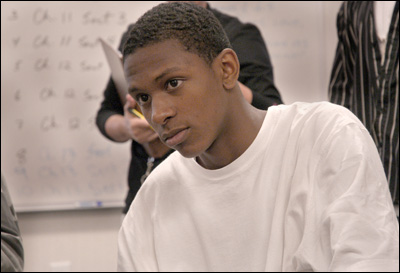 |

Year 1: Part 5 Things are not going very well for RJ McLaughlin at the end of freshman year. Basketball season is over. And school is as boring as ever. He's in his world history class. The teacher has written a series of questions on the board. It's a review of what they reviewed last week. They're getting ready for a test. RJ plays with his pencil, agitated.  RJ listening in class. Photo by Billy Barnes "A lot of stuff people say you going to use when you get out of high school," he says. "I don't know when I am ever going to have to know what a Chinese governor was, ever in my life." RJ says he looks at his textbooks and feels like it's his job to just memorize everything. When the reviewing is done and the class moves on to discussion, the teacher asks if anyone knows the definition of a republic. Many hands go up, including RJ's. Everyone blurts out answers. The teacher shushes them. "I need one answer, not five." And then he calls on RJ. "A republic? People who don't like Dominicans," RJ asserts. "No, no, no, no," says the teacher, shaking his head. "Oh, wait!" RJ says. "I'll find the answer, real quick," and he starts flipping through his book. But the teacher calls on someone else. "I need an education," RJ says later. "I just don't want one." And RJ is not only bored, he's nervous. The North Carolina end-of-course tests are coming up soon. His algebra teacher, Jo Adams, has recommended him for honors geometry next year, but RJ's not sure he can pass the state algebra test. And if he doesn't pass the test, he'll have to take the entire year of algebra again. NCLB "promises" - are students and families using them? Source: The Center on Education Policy. Math teacher Jo Adams is worried about RJ too. She's been offering extra test prep after school, but RJ rarely comes. Most of her students don't come and it's frustrating because she wanted to make them care, to at least try to do better in school. And she's feeling bad about herself because her test scores are so low. "The perception is that I'm a strong and good teacher," says Adams. "And then over the last two weeks, I've gotten my Algebra 1 scores back and I'm going, 'Their perception's got to be wrong. It's not reality.' So it's scary. Am I going to let these people down? Am I not really what the school needs?" When Adams is down, she speaks in a bit of a monotone, like she wants to keep what she's saying at arm's length. "So I don't know. I'm still not doing it right, or as good as I could, I think."
Testing week in North Carolina comes in early June. For Western Guilford High School, making Adequate Yearly Progress (the federal goal under No Child Left Behind) all depends on how students perform on these tests. Student Jessica Giardullo is feeling pretty confident about the tests. And she's looking forward to 10th grade, especially that creative writing class she signed up for. Student RJ McLaughlin? He's pretty sure he won't pass his algebra test. The only thing he's looking forward to is his summer basketball league. Teacher Jo Adams is not looking forward to seeing the test results. She is predicting that 60 percent of her students will fail. Still, Principal Randy Shaver is hopeful Western can make Adequate Yearly Progress. He's done the math based on the most recent benchmark test results, and he says if just two more African-American students can pass the algebra exam, the school will make the federal government's testing goal. That's how specific No Child Left Behind gets. Two students fail, and the whole school fails. But if they pass, Western passes.
Continue to Year 2, Part 1
|